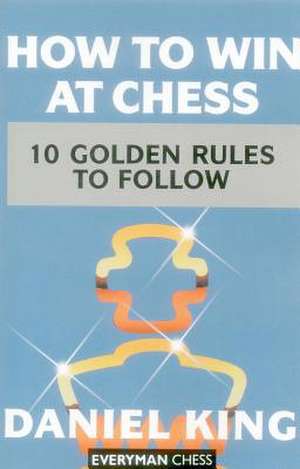How to Win at Chess: Classical & Indian
Autor Daniel Kingen Limba Engleză Paperback – 30 noi 1995
| Toate formatele și edițiile | Preț | Express |
|---|---|---|
| Paperback (1) | 70.88 lei 3-5 săpt. | |
| EVERYMAN CHESS – 30 noi 1995 | 70.88 lei 3-5 săpt. | |
| Hardback (2) | 48.73 lei 3-5 săpt. | +37.89 lei 4-10 zile |
| Pan Macmillan – 16 feb 2023 | 48.73 lei 3-5 săpt. | +37.89 lei 4-10 zile |
| callender press – 14 feb 2023 | 83.25 lei 3-5 săpt. |
Preț: 70.88 lei
Nou
Puncte Express: 106
Preț estimativ în valută:
13.57€ • 14.74$ • 11.40£
13.57€ • 14.74$ • 11.40£
Carte disponibilă
Livrare economică 31 martie-14 aprilie
Preluare comenzi: 021 569.72.76
Specificații
ISBN-13: 9781857440720
ISBN-10: 1857440722
Pagini: 1
Dimensiuni: 146 x 211 x 8 mm
Greutate: 0.16 kg
Editura: EVERYMAN CHESS
ISBN-10: 1857440722
Pagini: 1
Dimensiuni: 146 x 211 x 8 mm
Greutate: 0.16 kg
Editura: EVERYMAN CHESS
Textul de pe ultima copertă
If you are one of the thousands of players who understand the rules of chess, but would like to take their game beyond the elementary stage, then this is the book for you. Channel 4 television commentator Daniel King has devised a series of 'golden rules' to enable novice players to improve their game. 'How to Win at Chess' will put you on the path to better results and greater enjoyment of your own games. Outside the chess commentary box, Grandmaster Daniel King is an international player, chess trainer and regular columnist in 'CHESS Monthly' magazine. He is also the author 'How Good is Your Chess?' and 'World Chess Championship' (with Donald Trelford). (5 11/16' X 8 14/', 127 pages, illustrations)
Notă biografică
Daniel King is research fellow in Syriac studies and Semitic languages, Cardiff University, UK, and a translation consultant with SIL International. His research is principally concerned with methods and techniques of translation in antiquity especially between Greek and Syriac in the fields of philosophy and theology. He has published an edition of The Earliest Syriac Translation of Aristotle's Categories (Brill, 2010) as well as many articles in the field.
